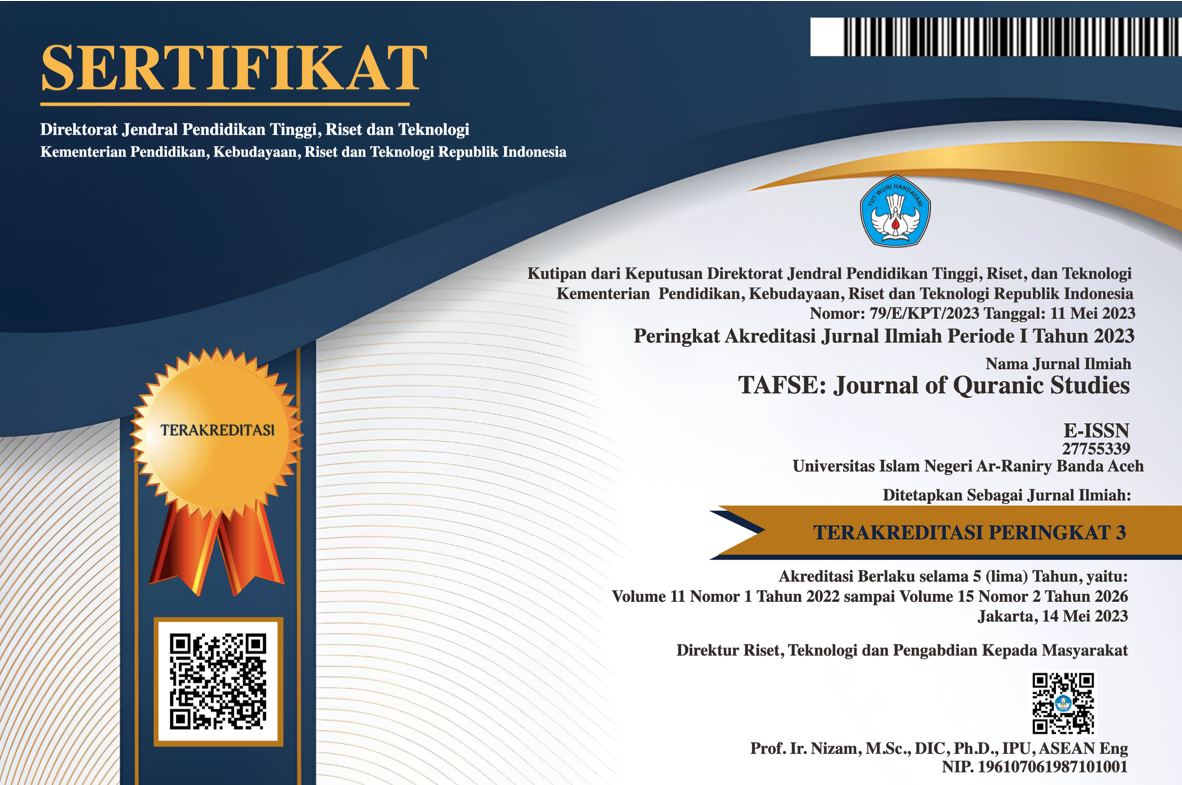Penafsiran Ayat–Ayat Amar Ma’ruf Nahi Munkar menurut Muhammad Fethullah Gülen
DOI:
https://doi.org/10.22373/tafse.v4i2.13179Keywords:
Amar Ma’ruf, Nahi Munkar, Fethullah GülenAbstract
Amar ma'rūf nahi munkar is the command of Allah swt. to invite to the good things and prevent the bad for society. Many interpreters have explained the meaning of the verses amar ma'rūf nahi munkar. Fethullah Gülen is a character who tries to give an interpretation of the verse by relating it to the reality of people's lives. This paper discusses the verses of amar ma'ruf nahi munkar interpreted by Muhammad Fethullah Gülen and issues surrounding the position of enforcing amar ma'rūf nahi munkar. This research is a descriptive literature study, wanting to describe the figure of Gulen who wants to be researched based on facts from existing news, books, and magazines. The results showed that Gülen classified the interpretation of the verses of amar ma'ruf nahi munkar in 3 parts. First, amar ma'rūf nahi munkar as the goal of life. Second, amar ma'ruf nahi munkar as a sign of a believer. Third, enforce the commandments of ma'rf nahi munkar in accordance with nature. According to Gülen, people who carry out this sacred task well, then they will be protected by Allah from all disasters that come from heaven or earth, even though the number of people who carry out this task is not much. Meanwhile, those who forget this task are feared to die in a state of hypocrisy, for neglecting the task that Allah has assigned to every Muslim.
Amar ma’rūf nahi munkar merupakan perintah Allah swt. untuk mengajak kepada hal-hal yang baik dan mencegah yang buruk bagi masyarakat. Banyak penafsir yang telah menjelaskan makna ayat-ayat amar ma’rūf nahi munkar. Fethullah Gülen merupakan seorang tokoh yang mencoba memberi penafsiran ayat tersebut dengan mengaitkannya pada realitas kehidupan masyarakat. Tulisan ini membahas ayat-ayat amar ma’ruf nahi munkar yang ditafsirkan oleh Muhammad Fethullah Gülen dan persoalan seputar kedudukan menegakkan amar ma’rūf nahi munkar. Penelitian ini bersifat kajian kepustakaan yang bersifat deskriptif, ingin menggambarkan sosok Gulen yang ingin diteliti berdasarkan fakta dari berita, buku, dan majalah yang ada. Hasil penelitian menunjukkan bahwa Gülen mengklasifikasikan penafsiran ayat-ayat amar ma’ruf nahi munkar dalam 3 bagian. Pertama, amar ma’rūf nahi munkar sebagai tujuan hidup. Kedua, amar ma’ruf nahi munkar sebagai tanda orang mukmin. Ketiga, menegakkan amar ma’rūf nahi munkar sesuai dengan fitrah. Menurut Gülen, masyarakat yang melakukan tugas suci ini dengan baik, maka mereka itu akan dilindungi Allah dari segala bencana yang datangnya dari langit atau bumi, meskipun jumlah orang yang menjalankan tugas ini tidak banyak. Sedangkan yang melupakan tugas ini, dikhawatirkan akan meninggal dalam keadaan munafik, karena melalaikan tugas yang dibebankan Allah kepada setiap orang Muslim.
Downloads
References
Ahmad Warson Al-Munawwir. Kamus Arab-Indonesia. t.tp.: Pustaka Progresif, 2002.
Atabik Ali, Ahmad Zuhdi Muhdlor. Kamus Kontemporer Arab-Indonesia. t.tp.: Multi Karya Grafika, t.th.
Fethullah Gülen. Dakwah - Jalan Terbaik dalam Berpikir dan Menyikapi hidup, Terj. Irsyad Ekseni. Jakarta: Republika, t.th.
Fethullah Gülen. Umit Burcu. Istanbul: Nil yayınları, 2010.
Hamdi Yazır. Hak Dini Kur’an Dili, Terj. Abdullah Yücel dkk, Jilid 4. Istanbul: Azim Yayınlari, 2007.
http://belgelerlegercektarih.com/2012/04/29/kemal-ataturkun-eseri-kuran-ve-ezanin-yasaklanmasi/, dikutip pada tanggal 16 Februari 2018
İbnu Manzhur. Mu'jam Lisan al-'Arab fi al-Lughah, Terj. Halil Ahmad Amayirah dan Ahmad Ebu Hayja, Jilid 1. Beirut: t.p., 1987.
Muslim. Sahih Muslim. Beirut: Dal al-Jayl, t.th.
Raghib El-Isfahani. Müfredat fi Gharib al-Qur’an. Istanbul: t.p., 1986.
Rasyid Rıza al-Husaini. Gerçek Islamda Birlik. t.tp.: Iz Yayıncılık, 1990.
Downloads
Published
Issue
Section
License
Authors who publish with this journal agree to the following terms:
- Authors retain copyright and grant the journal right of first publication with the work simultaneously licensed under a Creative Commons Attribution License (CC BY NC 4.0) that allows others to share the work with an acknowledgment of the work's authorship and initial publication in this journal.
- Authors are able to enter into separate, additional contractual arrangements for the non-exclusive distribution of the journal's published version of the work (e.g., post it to an institutional repository or publish it in a book), with an acknowledgment of its initial publication in this journal.
- Authors are permitted and encouraged to post their work online (e.g., in institutional repositories or on their website) prior to and during the submission process, as it can lead to productive exchanges, as well as earlier and greater citation of published work (See The Effect of Open Access).





